A recent study has shown that the rate of youth unemployment is three times higher than the rate of adult unemployment. This is a worrying trend, considering that our youth are the future leaders of our country. With the economy becoming more globalized and technology changing at a rapid pace, the need for students to be able to think critically and solve problems is more significant than ever before. So, how can educators produce wise and competitive learners who can find gainful employment? Below are five tips on how we can go about doing just that.
Teach Them How to Think Critically
One of the most vital skills that students need to learn is how to think critically. In today’s rapidly-changing world, they need to be able to think on their feet and adapt quickly to new situations. To do this, they need to be able to identify problems and come up with creative solutions.
One way to encourage this skill in students is to develop activities to get them thinking about the problem. For example, organizing an activity where students will answer challenging crossword puzzle books with a time limit can help them learn to work quickly and under pressure. These puzzles can improve memory and language skills and force individuals to think outside the box and consider multiple potential solutions. As a result, students who engage with challenging crossword puzzles are more likely to develop critical thinking skills and become more competitive learners in the long run.
Encourage Them to Be Proactive
In addition to teaching them how to think critically, educators must encourage students to be proactive learners. This means they should take an active role in their learning process instead of passively receiving the information. In the past years, the education system has been shifting towards a more student-centered approach, where students are encouraged to take control of their learning.
It motivates them to ask questions, seek resources, set goals, and solve problems independently. Proactive learners also tend to develop strong time management skills and the ability to think outside the box. In a competitive job market, these traits are vital for success. Therefore, nurturing a proactive attitude in students is key to producing wise and competitive learners.
Promote 21st Century Learning Skills
21st-century learning skills such as collaboration, communication, and digital literacy are highly sought after by employers. Therefore, educators need to promote these skills in their students. Group work is one way to encourage collaboration and communication skills while using technology in the classroom can help develop students’ digital literacy skills. There is doubt that technology will continue to play a significant role in their lives, so students need to be comfortable using various tools and applications.

In addition, 21st-century learning skills are crucial for finding a job and keeping it. With the rapid technological changes, employers often find that their employees must continuously update their skills to stay relevant in their roles. As such, students need to be lifelong learners who are always keen on learning new things.
Help Them Develop a Positive Mindset
A positive mindset is essential for success in any field, especially in today’s competitive job market. One fundamental way to do this is by encouraging a growth mindset. This means shifting the focus away from a fixed idea of intelligence and developing skills through effort and persistence. Additionally, instilling a sense of self-efficacy by giving students opportunities to challenge themselves and providing them with support can help to build their confidence in their ability to succeed. Building grit and resilience through facing setbacks and finding ways to persevere is crucial for producing wise and competitive learners.
Keep Them Up-to-date with Industry Trends
As the world continues to rapidly change and evolve, learners must stay ahead of the curve and up-to-date with industry trends. This not only helps them remain competitive in the job market but also allows them to make wise decisions that align with current realities. So how can educators and mentors facilitate this? One way is by regularly providing updates on recent developments in the field and encouraging students to research and stay informed. It’s also essential to ensure that the knowledge being imparted is relevant and applicable to today’s context. Incorporating industry guest speakers or arranging study trips or internships can give students a first-hand look at current challenges and practices.
Final thoughts
The global landscape is constantly changing and only getting more competitive by the day. As an educator, you must ensure that your students are prepared for the challenges they will face in the real world. By teaching them how to think critically, encouraging them to be proactive, and promoting 21st-century learning skills, you will help them develop into wise and competitive learners who are more likely to succeed in today’s economy.

